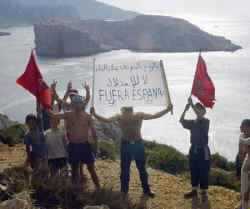HIGHLIGHTS: Madrid Wants Neither Country to Fly Their Flag over Leila (Perejil) Islet||Spanish Patrol Boats Shoo Away Sightseers, Journalists||Standoff Captures Worldwide Interest|| STORY: Spain waited for Morocco to respond to its pledge to withdraw from a disputed Mediterranean island if the Arab nation agreed to stay off, too. (Read photo caption)
"No one is more interested than Spain in maintaining the best relations with the Kingdom of Morocco," Prime Minister Jose Maria Aznar said Thursday.
His government wants to return to the arrangement where neither country flies its flag on tiny Perejil island, an uninhabited rock outcrop until last week.
Moroccan Foreign Minister Mohamed Benaissa denounced the takeover as a "declaration of war," but on Thursday his government remained conspicuously silent.
Two frigates, two smaller gunships and several Civil Guard police patrol boats circled the island, shooing away nearly a dozen boats carrying sightseers and journalists.
On the rock, two Spanish flags flew and some 30 soldiers kept guard.
With diplomatic relations at their lowest point in decades, Spain said it would not escalate the conflict nor cut economic ties with Morocco. Spain is one of Morocco's strongest trading partners and one of its biggest aid donors.
Officials also guaranteed the safety of some 200,000 Moroccans living in Spain as well as the estimated 1.5 million Moroccans who pass through the country each summer on their way home from Europe.
In Ceuta, a Spanish enclave on Morocco's Mediterranean coast close to Perejil, people went about their lives as usual with tens of thousands of Moroccans making the daily border crossing to work.
Under warm summer sunshine, Moroccans and Spaniards packed Ceuta beaches and others along the Moroccan coast.
STANDOFF CAPTURES WORLDWIDE INTEREST
The standoff - with its subtext of clashing notions of justice and equality, Europe against Africa, rich versus poor - has captured worldwide interest.
The European Union restated its support for Madrid, but ruled out sanctions against Morocco while The Arab League said it considers the island to be part of Morocco.
Morocco is seen by the West as a valuable friend in the Arab world and one which has supported the United States and its European allies in several international conflicts, most notably the Gulf War against Iraq.
But Spain has rarely had smooth relations with its Arab neighbor across the Strait of Gibraltar.
The countries bicker over illegal immigration and fishing rights, as well as Madrid's support for a U.N.-sponsored referendum on the Western Sahara, a former Spanish colony annexed by Morocco in the 1970s.
Ties between the two countries worsened since Aznar took office in 1996. Morocco recalled its ambassador last October without explanation.
PHOTO CAPTION
Moroccans protest Spanish presence on the disputed Perejil island, in the background, off Morocco's Mediterranean coast the day after Spanish commandos ousted Moroccan troops, July 18, 2002. Photo by Andrea Comas/Reuters
- Author:
& News Agencies - Section:
WORLD HEADLINES


 Home
Home Discover Islam
Discover Islam Quran Recitations
Quran Recitations Lectures
Lectures
 Fatwa
Fatwa Articles
Articles Fiqh
Fiqh E-Books
E-Books Boys & Girls
Boys & Girls  Hajj Rulings
Hajj Rulings Hajj Fatwas
Hajj Fatwas














